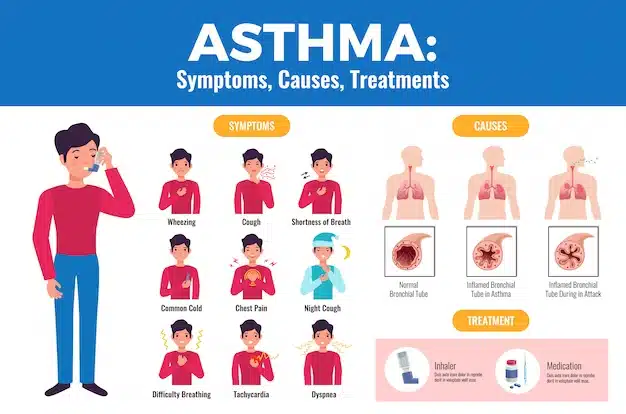Asthma is a chronic respiratory condition that affects millions of people worldwide. It causes inflammation and narrowing of the airways, leading to symptoms such as wheezing, coughing, and shortness of breath. While asthma cannot be cured, it can be managed with proper precautions and treatment.
In this blog, we will discuss some essential asthma precautions that can help you breathe easier and improve your overall health. Whether you have recently been diagnosed with asthma or have been living with it for years, these tips can help you take control of your condition and live a more comfortable and active life.
What is Asthma
Asthma is a chronic respiratory condition that affects the airways in the lungs. It is characterized by inflammation and narrowing of the airways, which can make breathing difficult. Asthma symptoms can vary in severity and frequency and may include wheezing, coughing, chest tightness, and shortness of breath. In some cases, asthma can be life-threatening, especially if it is not properly managed.

What Causes Asthma
The exact cause of asthma is not yet fully understood, but it is thought to be a combination of genetic and environmental factors. People with a family history of asthma or allergies are more likely to develop the condition. Environmental factors, such as exposure to air pollution, tobacco smoke, and certain chemicals, may also increase the risk of developing asthma.
Asthma triggers can vary from person to person, but some common triggers include:
- Allergens (e.g. pollen, dust mites, animal dander)
- Respiratory infections (e.g. colds, flu)
- Exercise or physical activity
- Cold air or changes in weather
- Air pollutants (e.g. smoke, smog)
- Certain medications (e.g. aspirin, beta-blockers)
By identifying and avoiding triggers and working with a healthcare provider to develop a personalized asthma management plan, people with asthma can effectively manage their symptoms and lead a healthy, active life.
Tips for Asthma Prevention
1. Identify Asthma Triggers
Work with your healthcare provider to identify what triggers your asthma symptoms and try to avoid them as much as possible.
2. Stay Away From Allergens
Common allergens that can trigger asthma include pollen, dust mites, and animal dander. Reduce your exposure to these allergens by keeping your home clean and well-ventilated, using air filters, and avoiding outdoor activities during high pollen seasons.
3. Avoid Smoke of Any Type
Avoid smoking and exposure to secondhand smoke, as well as other types of smoke such as wood smoke, incense, and candles.
4. Allergy-Proof Your Home
Dust-proof your home by using allergen-proof covers on pillows and mattresses, regularly washing bedding in hot water, and using a HEPA filter vacuum.
5. Get Your Vaccinations
Respiratory infections can trigger asthma symptoms, so make sure to get your annual flu vaccine and other recommended vaccinations.
6. Prevent Colds
Wash your hands frequently and avoid close contact with people who have colds or other respiratory infections.
7. Take Asthma Medications as Prescribed
If you have been prescribed medication for your asthma, it is important to take it as directed to prevent symptoms and control inflammation in the airways.
8. Use a Home Peak Flow Meter
A peak flow meter can help you monitor your asthma symptoms and determine if your medication is working effectively.
9. Follow Your Asthma Action Plan
Work with your healthcare provider to develop an asthma action plan that outlines what steps to take when you experience asthma symptoms or an asthma attack.
10. Immunotherapy Allergy Shots
Allergy shots can be an effective way to desensitize your immune system to allergens that trigger your asthma symptoms. Talk to your healthcare provider to see if immunotherapy is right for you.

By following these tips, you can help prevent asthma symptoms and improve your overall respiratory health. However, it’s important to remember that asthma is a complex condition that requires personalized care, so be sure to work with your healthcare provider to develop a treatment plan that meets your specific needs.
Read also: Understanding the Differences Between Asthma and COPD: A Comprehensive Guide
Conclusion
In conclusion, taking steps to prevent asthma is key to managing this chronic respiratory condition and reducing the risk of asthma attacks. Identifying triggers, avoiding allergens and smoke, allergy-proofing your home, and taking medication as prescribed are all important measures that can help keep asthma symptoms at bay. Additionally, working with a healthcare provider to develop an asthma action plan and using tools such as a home peak flow meter can also help manage asthma effectively.
At Ayu Health, we are committed to providing personalized healthcare solutions for individuals living with asthma and other respiratory conditions. Our team of healthcare providers and respiratory specialists work closely with patients to develop customized treatment plans that take into account their unique needs and concerns. Through our telemedicine platform, patients have access to convenient and affordable care from the comfort of their own homes.
If you or a loved one are living with asthma, we encourage you to schedule a consultation with our team today.
Our Hospital Locations
General Surgery Hospitals in Chandigarh | General Surgery Hospitals in Bangalore | General Surgery Hospitals in Jaipur | General Surgery Hospitals in NCR | General Surgery Hospitals in Hyderabad
Our Doctors
General Surgery Doctors in Chandigarh | General Surgery Doctors in Bangalore | General Surgery Doctors in Jaipur | General Surgery Doctors in NCR | General Surgery Doctors in Hyderabad
About the Author

Dr. S. Goel
Dr. S. Goel is a renowned Internal Medicine Specialist currently practicing at Ayu Health, Bangalore. He is a Specialist in Internal Medicine, Diabetes HTN, Paediatric Care, and Family Medicine.




